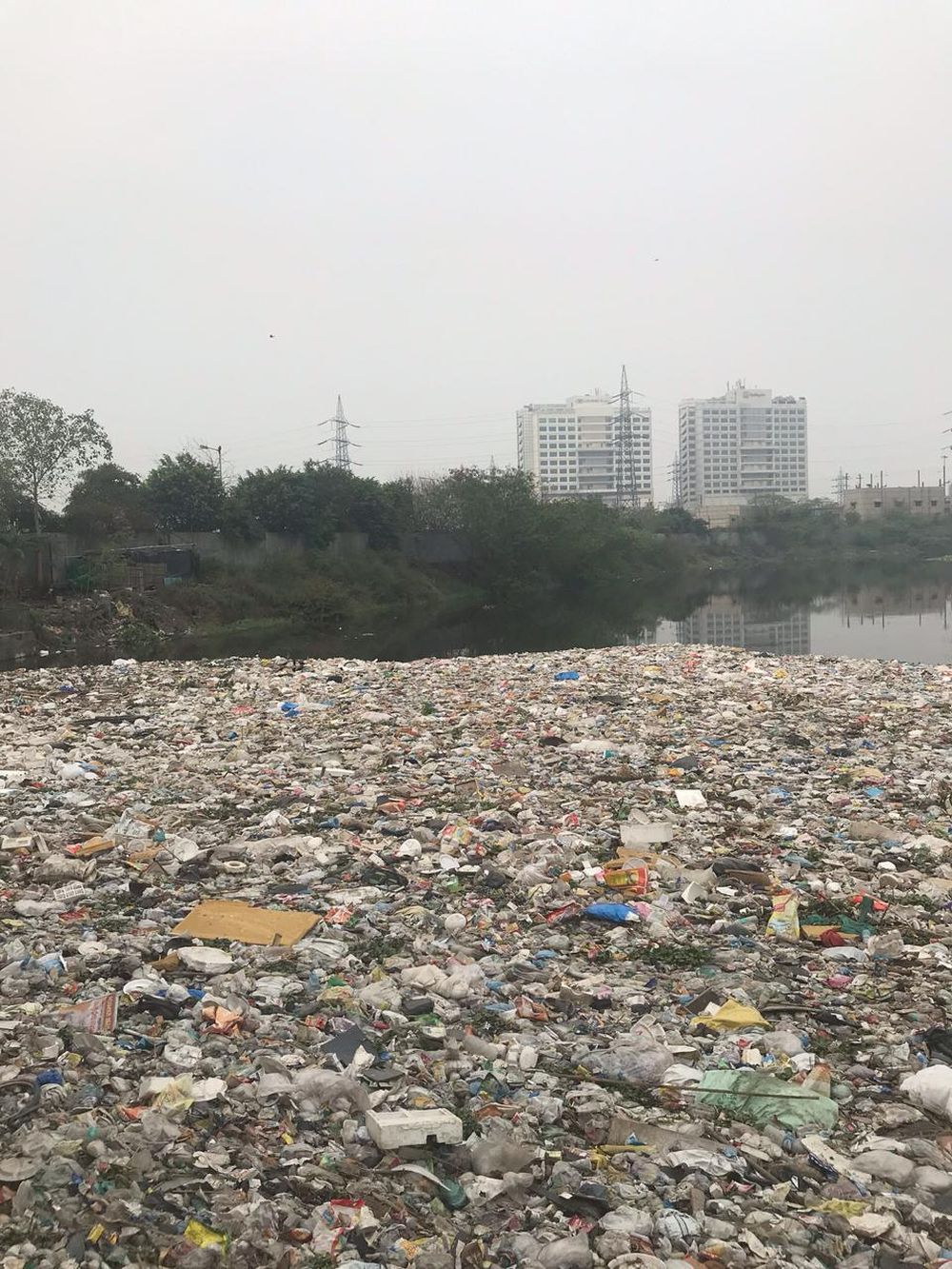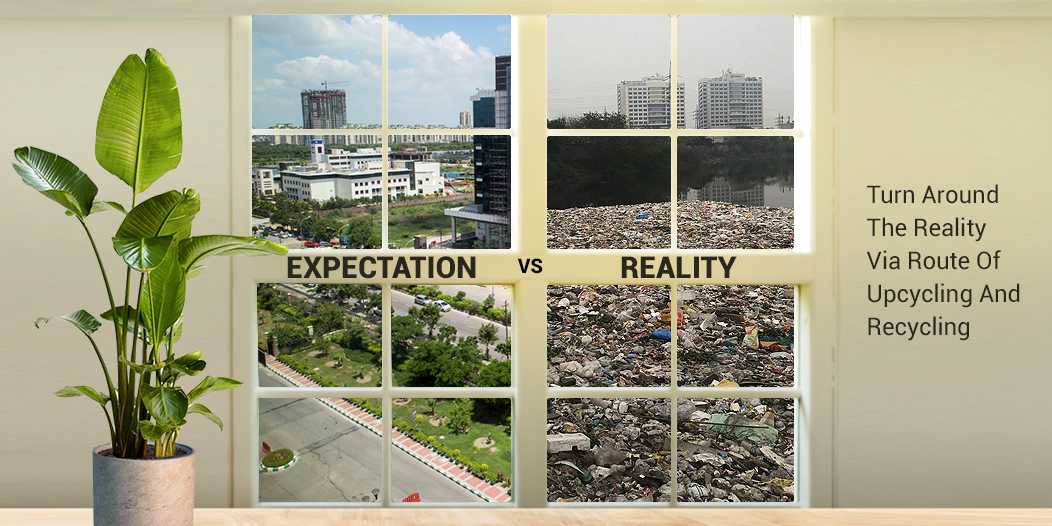New Delhi: Picture this – On one side of a road there are high-rise buildings that are almost touching the sky with a breathtaking view of the river and lush greenery. Sounds like a dream? This could be the reality for many areas in the National Capital Region – New Delhi. But sadly is not. On a field trip in the Capital to assess Delhi’s garbage crisis, NDTV team spotted many sites dotted with long drains almost looking like a canal or a tributary of a river choking with garbage, plastic and barely visible water, blackened with waste.
One of the sites for the field trip was East Delhi’s New Ashok Nagar area, where NDTV team spotted one huge drain that was directly flowing to the Yamuna River and was a channel of free-flowing waste, frothing toxins, almost looking like snow and was the epitome of the garbage crisis of Delhi and the country as a whole.

A drain near New Ashok Nagar area in East Delhi highlights the grim situation of waste management in the national capital region
The drain we spotted carried countless plastic items such as bottles, cutlery, poly bags, toothpaste, shampoo bottles, and everything else possible. A thriving proof of the non-existence of waste management. When NDTV visited three slum clusters and an apartment in New Ashok Nagar and spoke to residents about the piling garbage and indiscriminate disposal, we discovered that people are not aware about the basics of waste management.
Also Read: 5 Ways To Replace Plastic Cutlery In Your Daily Life
What Is Waste Management?
In simple terms, waste management are the activities and actions required to manage one's waste from its inception to its final disposal. The steps include collection of waste via waste segregation, managing it effectively through upcycling, recycling.

Though the field trip reiterated the already gloomy waste management scenario, it also yielded a positive story that if adopted can be one of the ways to solve India’s garbage crisis. We met a family of four, 36-year-old Vidit Arora and his 30-year-old wife Jyotika along with their two daughters living in East End Apartments in the locality, who on their own recently adopted the basic rules of waste management – waste segregation, upcycling and recycling to embrace a zero-waste lifestyle.
What Is Zero-Waste?
Zero Waste basically means living a sustainable life where a person is responsible for throwing zero waste outside their home. Whatever waste is generated is managed effectively thereby by preventing resource extraction, reducing the amount of materials sent to the landfill or incinerator, and reducing pollution from producing, transporting, or disposing of materials.

Explaining what the family has been doing from the past four months and a half, Vidit Arora said,
At our home we have two bins – a blue coloured dustbin is for putting our household dry waste such as newspaper, packaging, juice packets, plastic packets etc and a green dustbin is for adding our daily kitchen or wet waste such as vegetable peels, egg shells, leftover food items to name a few. We also have a three-bin on-site composting unit at home, one which we purchased online. It is our daily ritual to empty our wet waste bin into the topmost pot and cover it up with cocopeat powder (which you get with the composting unit). Once our pot is full, we rotate it with an empty pot. By the time the empty pot gets filled, our compost gets ready. This compost is then used in our garden from where we are also growing many veggies and fruits.
Along with managing the wet waste effectively, the Aroras are also managing their dry waste effectively. The family has divided dry waste into various categories – electronic waste, plastic waste, newspaper waste and tetra packs and cardboards. The electronic waste of the house – from old electronic toys, batteries, tube lights, gadgets etc. Aroras collect in one or two months’ time and once the collecting bin is full then it is sent to an e-waste recycling unit. Jyotika adds,
It is such a simple process, we collect all the waste in our store-room, whenever the bin gets full, we call Namo E-waste Company (a start-up in Delhi that helps in effective e-waste management), they come home, take it and helps us ineffective recycling process.
The newspaper and paper waste are given to a kabadi wala or waste picker separately, once a month. Whereas tetra packs and cardboards are deposited at a nearby convenience store, Reliance Fresh, they have collection points for the purpose of recycling cartons effectively.
Basically, this process is called recycling. We are calling the vendors who specialize in dealing with the particular type of waste and help recycle it effectively. Recycling is done for items that cannot be decomposed naturally. These recycling chains convert our trash into products or materials that can be used again in some form within the society. Today, there are many vendors out there, one just needs to be educated and be aware about it. Urban people can manage the waste like we are doing, whereas, people living in slums can collect such recyclable waste and sell it to kabadi walas or waste pickers and earn some extra money. This process itself can reduce the waste load from the planet, adds Vidit.
Also Read: Free India From Trash: 5 Smart Ways To Upcycle Waste Into Things Of Daily Utility

Aroras collect the plastic bottles and upcycles it as flower pots, whereas compost is used as manure for these plants
What Are 3 R’s?
Three R’s - reduce, reuse and recycle are all the basic steps of waste management that help to cut down on the amount of waste we throw away, thereby conserving natural resources, landfill space and energy.

Along with the process of recycling, the Aroras are also following the process of upcycling, which is a creative way to reduce waste. The meaning of upcycling is basically re-using discarded objects or materials or re-purposing these creatively to make décor items or utility products that can then be used at home once again. From discarded plastic bottles being used as lamps to old CDs (compact discs) being used as wall art and used glass bottles being converted into a decorative vase, the Arora family’s home is a living proof of waste management done right. Sharing highlights of her upcycling journey, Jyotika said,
When you segregate waste, you tend to realise how much waste you generate and how much of it straight away goes to the landfills or the open drains like NDTV spotted in New Ashok Nagar. The process of upcycling is so easy, all you have to do is wear your creative hat and manage the waste I started this process soon after we started composting. No matter how much you restrain from using plastic items, it ends up coming in contact. Same was the case with us, so I started utilising these small items into useful decorative things. It is not rocket science, it is just creativity. If we can, everyone can, one just need to get the waste management game going, signs off the Arora family.
Also Read: Goodbye Plastic, Hello Creativity: Five Easy Ways To Reuse Plastic Bottles
What Is Upcycling?
Upcycling is basically a creative way to reduce waste. Going by the definition, the meaning of upcycling is reusing discarded objects or material to make creative products that are of higher quality or value than the original.

In India, 62 million tonnes of waste is generated annually, out of this waste 70-75 per cent remains untreated and is thrown straight away into the landfills. If this 70-75 per cent of waste is conserved through effective waste management steps – be it composting, upcycling or recycling, then just think how much amount of garbage burden can be cut.
Fighting India’s Garbage Crisis
Fighting India's Garbage Crisis
-
Challenges India Is Facing In Managing Its Waste
-
Things To Know About Composting
-
All About Upcycling And Recycling In India
-
Rural Haryana Aims To Improve Its Waste Management, Here's How
-
How Urban India Can Help In Effective Waste Management
-
Delhi Is Not Segregating Its Waste, An On Ground Report
Fighting India’s Garbage Crisis is a special series by NDTV-Banega Swachh India team. As a part of the series, we want to highlight the basics of waste management system in India along with an on-ground report of the National Capital Region about the challenges it is facing when it comes to managing its waste effectively.
NDTV – Dettol Banega Swachh India campaign lends support to the Government of India’s Swachh Bharat Mission (SBM). Helmed by Campaign Ambassador Amitabh Bachchan, the campaign aims to spread awareness about hygiene and sanitation, the importance of building toilets and making India open defecation free (ODF) by October 2019, a target set by Prime Minister Narendra Modi, when he launched Swachh Bharat Abhiyan in 2014. Over the years, the campaign has widened its scope to cover issues like air pollution, waste management, plastic ban, manual scavenging and menstrual hygiene. The campaign has also focused extensively on marine pollution, clean Ganga Project and rejuvenation of Yamuna, two of India’s major river bodies.





 Challenges India Is Facing In Managing Its Waste
Challenges India Is Facing In Managing Its Waste Things To Know About Composting
Things To Know About Composting All About Upcycling And Recycling In India
All About Upcycling And Recycling In India Rural Haryana Aims To Improve Its Waste Management, Here's How
Rural Haryana Aims To Improve Its Waste Management, Here's How  How Urban India Can Help In Effective Waste Management
How Urban India Can Help In Effective Waste Management  Delhi Is Not Segregating Its Waste, An On Ground Report
Delhi Is Not Segregating Its Waste, An On Ground Report
























